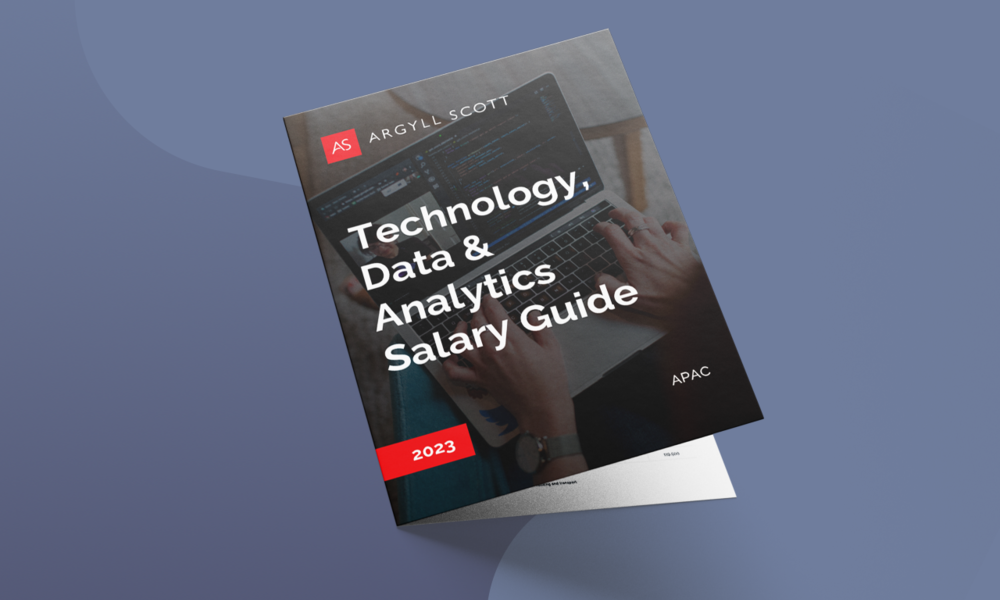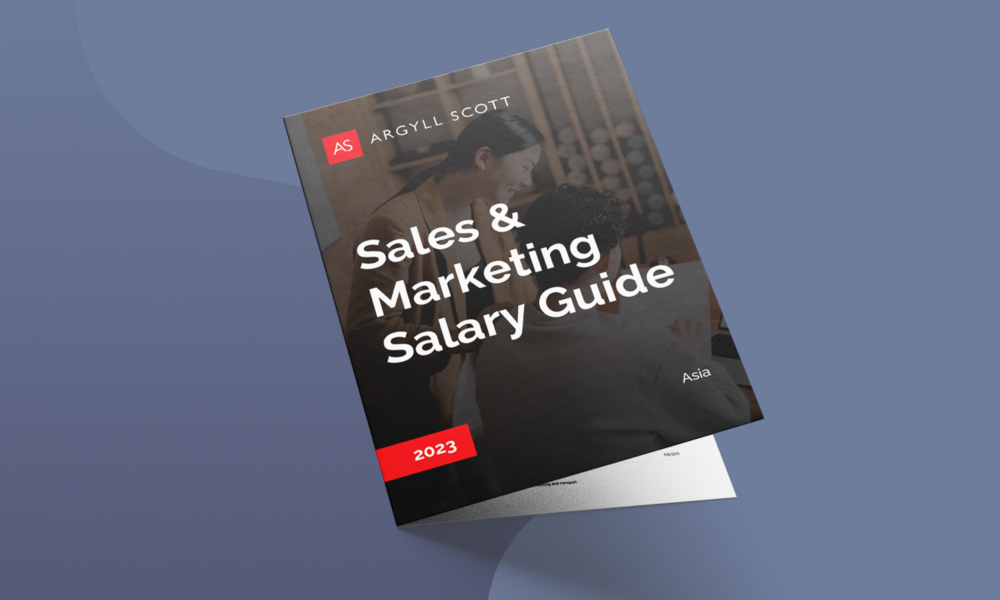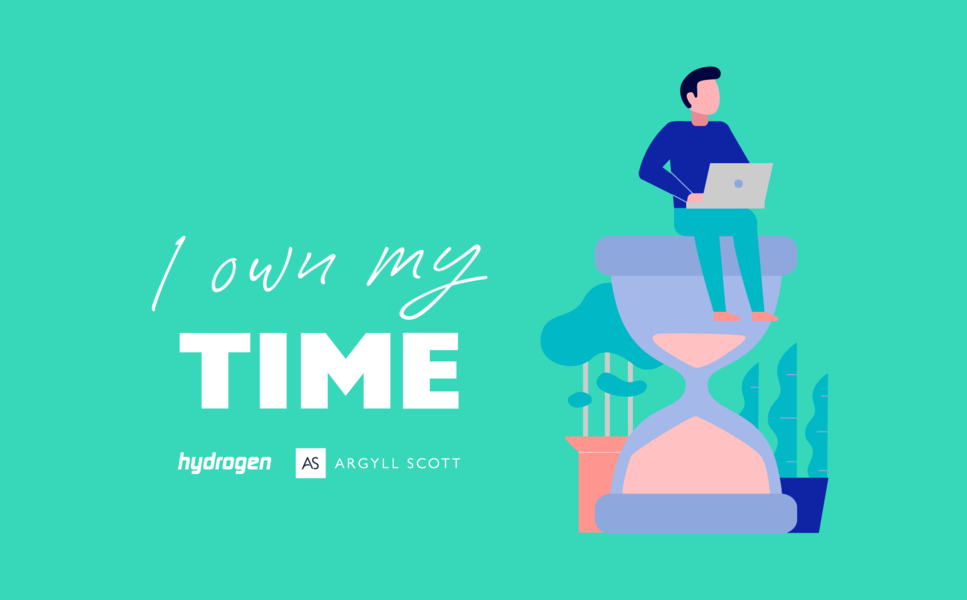Our expert views
Find out about the latest news and events from Argyll Scott and browse through our blogs.
WORKING AT ARGYLL SCOTT
A deep dive into the ethical considerations of using AI in recruitment
Our latest insights

In today’s rapidly evolving job market, AI has emerged as a powerful tool in recruitment, with 70% of businesses now using AI-powered applicant tracking systems (ATS) to find and hire talent. Despite research showing that using AI sources candidates 75% quicker than conventional techniques, there are huge concerns across the industry about its ethics. From gender-biased algorithms to removing the human touch, we’re unpicking the good, the bad and the ugly when it comes to using AI in your hiring process – and sharing our best practices when it comes to keeping things ethical. Let’s dig in! The Good: Where and why businesses are turning to AI for hiring The three most common ways of using AI in hiring is for CV screening, candidate sourcing, and using chatbots for initial interactions - but the list goes on, to interview scheduling, skills assessments and onboarding. Hiring teams are reaping the benefits, with AI enabling them to quickly sift through large volumes of applications, identify top candidates, expand their talent pools and find passive candidates, significantly reducing business’ time-to-hire. We’ve seen that where AI is used well, is for mundane tasks, saving employers time to focus on enhancing good, old, human interaction. CV screening Generative AI has significantly shifted the industry, with its ability to scan large volumes of CVs and match candidates to roles based on skills rather than just job titles. Tools like Canditech and HireVue promise to refine the selection processes through extracting key information from CVs and matching them with available job descriptions. Where hiring teams would otherwise need to manually review each application, these tools sift through CVs automatically and highlight the most suitable candidate for the position. Candidate sourcing Businesses are also using AI-driven candidate sourcing tools to identify and reach out to potential candidates more efficiently, enabling them to manage a larger talent pool without getting bogged down in administrative work. LinkedIn Recruiter now includes AI functions such as AI-Assisted Search and AI-Assisted Messages to help users target the right people and create personalised messages for their initial outreach. AI-Assisted Messages uses AI to draw on profile information provided by the candidate and combines it with the job requirements, saving hiring teams hours of time skimming LinkedIn profiles to gather insight. Chatbots Using chatbots for initial candidate interactions has been a contentious topic among industry leaders and has its obvious downfalls – mainly, its lack of personalisation and not being able to deal with complex issues. However, with many candidates searching for roles in the evening having worked at their current roles all day, an evening AI chatbot answering queries while your workforce is offline could ultimately booster your customer experience. Automated responses can also be used to avoid candidate ‘ghosting’, although if this is an existing problem, we’d probably advise to take a look at the root cause! Where chatbots take a turn for the worse, is when businesses continue the AI interactions into the first rounds of interviews – we’ll get to that travesty shortly… The Bad: Where to be cautious Gender-biased algorithms One of the main ethical issues when it comes to using AI in the hiring process is its risk of reinforcing existing biases. Afterall, AI only generates the information it’s trained on, meaning that the input data can directly influence the decision-making in algorithms. The difference in the gender pay gap in STEM industries for example is still at around a 30%, and interestingly, women account for less than 25% of AI specialists. Because this information originally accentuates gender biases in the STEM industry, there is a risk that AI algorithms will replicate these biases in decision making. A well-known example of this is when Amazon used automated CV screening, which used CV samples from candidates over a 10-year period to train its recruitment model. The model picked up historical patterns by analysing language patterns on CVs, and, due to the previous underrepresentation of women, began associating male candidates with the language commonly found on CVs of successful employments. On the other hand, CVs that included language often associated with women were dismissed by the algorithm. A more recent example is Carnegie Mellon University’s research, which found that Google Ads exhibited gender discrimination, showing males better paying jobs than female job seekers. Brookings Institution’s Aylin Caliskan argues that AI algorithms, “need to be transparently standardised, audited and regulated […] Trustworthy AI would require companies and agencies to meet standards, and pass the evaluations of third-party quality and fairness checks before employing AI in decision-making”. More and more businesses who use AI are adopting audit mechanisms as a step towards regulating AI biases. Out of interest, we reached out to PreScreenAI , a platform designed for AI-powered job interviews to ask how they avoid gender-bias. They commented, “[our] software has its own mechanism for avoiding [gender bias] and a specific methodology to test that.” However, Erica Sweeney from Business Insider points out that over 80% of companies using AI hiring tools lack proper oversight mechanisms to prevent biases […and] without rigorous auditing and regulation, these biases could become deeply embedded in AI-driven hiring practices.” It's clear that careful oversight is essential to ensure AI doesn’t perpetuate the same old biases. Despite many platforms promising to enable a more diverse and inclusive hiring process, businesses should be extremely wary of biased AI algorithms. Data privacy Another issue businesses should consider is how their AI-powered processes are using and collecting candidate data. Businesses using Open AI (or similar) to generate and automate candidate interactions should be wary of the kind of data they’re feeding into their system. If businesses are inputting private data such as email addresses and names, then being transparent with candidates about how their data is being used is crucial. The Ugly: Replacing essential human interactions With 68% of jobseekers saying they want to be engaged with at least 1-2x per week, you can see why many hiring teams are cutting corners and automating their interactions. Platforms like Zapier allow you to use Chat GPT 4 to automate workflows such as candidate sourcing, assessments and scheduling, saving hiring managers hours of time. Where this turns ugly however, is when AI starts to seep into the workflows where personalisation and real human interaction is essential. We’ve seen some businesses use AI platforms to assess candidates based on their tone of voice, buzz words they use and even their head movements. Some platforms also provide the functionality to carry out first stage interviews with an AI avatar. When we asked our network how they’d feel if their first stage interview was with an AI bot, over 80% said they would hate it. One respondent commented, “if I receive a request to do a 1-way interview with AI, I ignore it and drop out of the interview process. Companies which use [AI interviews] expect candidates to invest time preparing for such ‘interviews’ yet demonstrate they are unwilling to invest time themselves.” In the end, while AI can significantly boost efficiency in recruitment by automating routine tasks, it’s crucial not to let technology replace the personal touch that candidates value. The backlash against AI-driven interviews and impersonal assessments underscores the need for a balanced approach. Businesses should harness AI's strengths to streamline processes but remain committed to genuine, human interaction where it matters most. Using AI ethically: our best practices There’s a common phrase quickly making its way around the industry, which is that HR won’t be replaced by AI. HR will be replaced by humans who are using AI to their advantage. To harness the benefits of AI in your hiring process while maintaining ethical standards, check out our Ethical AI: Best Practices: 1. Balance automation with personal touch Use AI to streamline tasks such as candidate sourcing, but ONLY to enable more time to focus on real human interactions. If you’re struggling to figure out which of your processes to automate, try noting down your core workflows. Ask yourself how much time you spend on the activity, how frequently the activity needs to be completed, and assess whether it can be automated or not while keeping candidate experience at the forefront. 2. Make candidate experiences engaging and respectful Avoid over-reliance on AI for tasks where personal interaction is essential. Chatbots and auto-responses are good way of acknowledging queries and initial interactions, especially if a candidate needs support during offline hours. However, don’t over-use AI for things like first stage interviews, where employer/candidate connection is key to a good customer experience and ensuring a good cultural fit. 3. Be wary of biased algorithms If you’re using AI for things like targeting candidates, initial screenings, and assessments, be extremely wary of gender biased algorithms and ensure your AI platforms use ethical AI practices such as establishing processes to test for and mitigate bias and investing in bias research. 4. Prioritise data privacy Be transparent about how candidate data is collected and used. Ensure that all data handling practices comply with privacy regulations and inform candidates about how their information is being processed. 5. And last but not least, MAINTAIN HUMAN OVERSIGHT! AI should support, not replace, human judgment. Use AI-generated insights as a tool to aid decision-making, but rely on human expertise for final decisions and to provide that oh-so-important personal touch in candidate interactions. Useful links and references https://www.selectsoftwarereviews.com/blog/applicant-tracking-system-statistics#:~:text=70%25%20of%20large%20companies%20currently,strengthen%20the%20overall%20candidate%20experience https://seas.harvard.edu/news/2023/06/how-can-bias-be-removed-artificial-intelligence-powered-hiring-platforms https://zapier.com/blog/automate-chatgpt/ https://www.herohunt.ai/blog/ai-screening https://www.indeed.com/career-advice/news/workforce-insights-report-job-search-anxiety-tips#:~:text=While%2069%25%20claim%20to%20be,feelings%20of%20stress%20and%20anxiety . https://www.linkedin.com/pulse/ethics-ai-recruitment-triton-ai/ https://www.stemwomen.com/the-gender-pay-gap-in-stem https://www.brookings.edu/articles/detecting-and-mitigating-bias-in-natural-language-processing/ https://www.businessinsider.com/executives-navigate-ai-hiring-tools-anti-bias-laws-2024-5 https://theglobalobservatory.org/2023/03/gender-bias-ethical-artificial-intelligence/ https://therecruitmentnetwork.com/events/all-things-ai-and-future-tech-4/

Digital Natives’, Gen Z, have a whole new set of preferences employers need to be aware of. New data is dispelling some of the common stereotypes – notably, that they are definitely not ‘lazy’, but in fact the generation most likely to describe themselves as career-focused. With the average tenure of Gen Z now at 2 years and 2 months, businesses need to work harder than ever to attract and retain younger talent. After all, they’re our future leaders – let’s set them up for success! Here are 4 things your business can be doing now: 1. Embracing the adoption of AI to meet Gen Z expectations Gen Z is the least likely of all generations to be fearful of AI, with over 50% using Chat GPT in the workplace. 23% feel it’s appropriate to use AI for workplace emails, and 20% feel it’s appropriate to use AI for job applications, demonstrating Gen Zs dependence on AI and trust in its abilities. Businesses need to meet Gen Z’s expectations of AI in the workplace and use it to their advantage. Consumer research Firm GWI points out, “Millennials brought a wealth of internet experience with them into the workplace, now Gen Z are doing the same with AI. There’s an opportunity here for companies to hire AI-natives who can use the technology in creative ways for their business.” Implementing AI doesn’t need to be complicated. Hydrogen’s Associate Director of Technology, Scott McCormick says, “To attract and retain Gen Z talent, businesses should embrace AI by integrating it into daily operations and offering training on AI tools. Starting with user-friendly AI platforms can empower companies to meet Gen Z's tech-savvy expectations and drive innovation.” 2. Define clear career pathways to reduce anxiety According to Cigna International Health’s recent survey, 91% of 18-24-year-olds report feeling stressed at work. This is believed to be down to the fact that they entered the workforce post-Covid, meaning that many Gen Zers were not used to corporate social interactions having completed their degrees in isolation. Economic downturns are also causing career anxiety for younger generations entering the workforce, with redundancy cases rising globally. Defining clear pathways for Gen Z will likely reduce anxieties around job loss and provide direction, aligning their goals with actionable steps. Career pathways can help all employees visualise their future growth and keep them feeling motivated to succeed. Hydrogen’s Senior Business Development Manager in the US, Marina Hart, says on the matter, “Gen Z grew up amid unprecedented technological advances, economic uncertainty and political unrest in many parts of the world[…] they value the clarity of expectations.” 3. Move your marketing to the right social media platforms It’s no surprise that the generation most likely to use Instagram and Tik Tok is Gen Z. This prospect has rushed businesses to start up their own Tik Tok and Instagram accounts, scrambling for edgy, short-form video content. However, it might surprise some that YouTube is the most-used platform for Gen Z, with 80% spending their time on the app. This presents opportunities for businesses to create their own YouTube content, allowing for longer, more informative videos. The platform offers sponsored features, an effective algorithm and precise audience targeting. Businesses will also be interested to know that X and Facebook are among the least popular platforms for Gen Z. Therefore, if companies hope to target younger talent, they might consider moving their social media marketing efforts over to Gen Zs most used platforms. 4. Implement targeted incentives to retain talent Out of all the generations, Gen Z is the most prone to experiencing mental health illnesses, with one in three 18–24-year-olds reporting symptoms of depression or anxiety. Therefore, businesses which offer wellness programmes, such as mental health support, are likely to appeal to the younger generation. More than a half of Gen Zers prefer a hybrid set up, and 38% reported that one of the biggest barriers to finding their dream job is businesses requiring five days a week in the office. CIPD offer great advice on how to plan and support effective hybrid working to companies considering improving their flexibility options. Travel incentives like team holidays and social experiences are also likely to appeal to Gen Z, especially with travel influencers taking Tik Tok and Instagram by storm. However, because Gen Zs aren’t generally at their peak earning age, businesses have a great opportunity to inspire new talent with travel incentives that they might otherwise not be able to afford. Hydrogen’s Head of TA, Dean Jennings, says, “It's important to ensure that incentives are inclusive. The next generation coming through our doors are ultra-marathon runners, semi-professional athletes and avid campaigners for a better world. They have a completely different grasp of what they want to do with their time. Whilst there is a place for boozy incentives, it is no longer the "go to" for a lot of individuals joining the workforce and they are craving something much more intellectually stimulating". This points towards businesses also offering educational incentives such as training and development programmes. Interested in learning more about generational preferences at work? Read our recent blog on how to work alongside different communication styles and work life expectations - and bridge the digital divide: ‘FIVE generations side-by-side: How to thrive in a multi-generational workplace’ https://www.hydrogengroup.com/five-generations-side-by-side-how-to-thrive-in-a-multi-generational-workplace This article was made possible by: GWI: The New Age o f Gen Z https://www.theguardian.com/society/2024/mar/03/whats-up-with-generation-z https://www.cnbc.com/2023/04/17/gen-z-travel-trends-travel-often-save-money-and-seek-adventure-.html https://www.bbc.com/worklife/article/20230215-are-gen-z-the-most-stressed-generation-in-the-workplace https://later.com/blog/gen-z-social-media-usage/ https://www.cipd.org/uk/knowledge/guides/planning-hybrid-working/

For the first time in history, five distinct generations are working side-by-side. That’s Gen Z, Millennials, Gen X, Baby Boomers and the Silent Generation all under one roof. While to some this might sound like a nightmarish family reunion at the office, this combination brings about unique benefits that aren't being talked about enough.

Hydrogen Group and Argyll Scott appoint Joel Forrester as Global Managing Director - Client Services
12 July, 2024 - Hydrogen Group and Argyll Scott appoint Joel Forrester as Global Managing Director - Client Services. Joel brings a wealth of experience to the role, having demonstrated a strong commitment to excellence in client services over his career. His dynamic approach and dedication to growth and development in teams make him a perfect fit for Hydrogen Group's ambitious future. On the new role, Joel commented: “I am so excited to be joining Hydrogen Group. I have already met many of the truly fantastic people here, who are passionate about providing a world-class service to our clients and candidates alike. The golden thread that is clear to see is the work ethic and desire to evolve as people and teams. This energy and belief in the future is infectious, and I have no doubt this will be the foundation of our future success.” He added: “The first connections I had with Hydrogen Group provided an accurate steer. The team is innovative, passionate, diverse, forward-thinking, and authentic, which is reflective of the strong and inclusive culture here. This is embodied by Hayley, our CEO – whose inspiration filters down through all levels, layers, and regions of the business. I believe fully in the direction of Hydrogen Group and I am excited to have a lot of fun along our journey over the coming years as we continue to thrive in an ever-changing world.” CEO Hayley Still commented: "Joel’s arrival marks an exciting chapter for Hydrogen Group. His expertise and forward-thinking mindset are precisely what we need to elevate our client services to new heights. When we started our discussions, it was clear that Joel’s innovative attitude was aligned with our vision for the future. His passion for cultivating a vibrant, collaborative environment will be instrumental in driving our growth. We are thrilled to have Joel on board and look forward to the dynamic impact he will undoubtedly bring." Contact Information For more information, please contact: marketingsupport@hydrogengroup.com About Hydrogen Group Hydrogen Group is a global recruitment agency dedicated to helping organisations find the best talent in the life sciences, legal, engineering, business transformation, and technology sectors. Our mission is to enable people to thrive in a changing world through innovative recruitment solutions and exceptional service.

You may have noticed us sharing polls across our network recently around LGBTQ+ recruitment practices... and our results are now in! With insights analysed from over 1430 LinkedIn users, we're excited to bring you a benchmarking guide alongside resources to help support the LGBTQ+ community in the workplace. 55% believe that providing inclusive healthcare benefits is the most important factor to making an organistation more attractive to LGBTQ+ candidates. This means offering medical and wellness services that meet the unique needs of LGBTQ+ individuals. This doesn’t just mean providing non-discriminatory access to things like maternity, paternity or adoption leave, which by law is a minimum. It means providing access to care which caters for every individual. This could be anything from tapping into training networks to ensure respectful communication, offering sexual and reproductive health services tailored to LGBTQ+ needs, or access to gender-affirming care. 27% of our network believed that providing support for transitioning employees was the most important factor, further emphasising the critical role healthcare inclusivity plays in making an organisation more appealing to LGBTQ+ candidates. We also received comments and questions around the need for separate benefits, opening the conversation around equity vs equality, and how standard employee benefits can overlook the needs of LGBTQ+ employees. More than a third of LGBTQ+ candidates looking for work are worried about being discriminated against due to their sexual orientation or gender identity. Outwardly showing your support through the inclusivity of your company benefits can help alleviate concerns around being accepted in the workplace as well as show your allyship towards the LGBTQ+ community. 71% of our network do not work in companies that have specific initiatives to recruit LGBTQ+ talent. Even though our network agrees that factors like healthcare benefits and supporting transitioning employees should be high on the agenda, 71% of our network admitted that their organisations do not have specific initiatives to attract LGBTQ+ talent. This proves that some businesses have a long way to go towards championing allyship. We also received comments on this poll reflecting different perspectives, such as “Isn’t this discriminatory?”, in reference to businesses having initiatives specifically to recruit LGBTQ+ talent. This is a common misconception and draws back to the theme of equity over equality. Equality refers to individuals or groups having the same rights. Equity, however, recognises that each person is different and therefore needs specific treatment to reach an equal outcome. Another comment we received on the poll was, “Leave your personal life at home”. Again, this is a misconception and to create a true sense of belonging at work, employees need to be able to bring their full selves to work and feel accepted. 17% answered that their businesses had multiple initiatives to attract LGBTQ+ candidates, which is a notable amount. It would be interesting to see if this figure increases year on year (stay tuned), as LGBTQ+ allyship becomes increasingly higher on the agenda for businesses looking to elevate their work culture. Listening is the best way to support LGBTQ+ coworkers On allyship, we asked our network, “How have you supported your LGBTQ+ coworkers?” The most popular form of support was “listening actively.” Active listening is a crucial communication skill in which the listener must be acutely aware of the speaker's needs and underlying messages before providing feedback, rather than passing judgment or simply listening to intervene. It sounds simple, but it’s difficult to master, and the poll responses show an understanding that listening is key when building an environment of belonging for the LGBTQ+ community in the workplace. If you're curious about how to improve active listening skills at work, Mit Human Resources provides Key Tips for Active Listening. 22% of our network said “inclusive language” was the most important way to support LGBTQ+ employees, whilst 29% answered, “challenge discrimination”. In a constantly changing world, using inclusive language and challenging discrimination helps build an environment of respect and acceptance. Academy To Innovate HR offers practical tips on how to use inclusive language: A Guide to Using LGBTQ Inclusive Language in the Workplace. A Great Place to Work also provide simple and effective tips to challenging discrimination in the workplace: 5 Powerful Ways to Support LGBTQ+ Employees in the Workplace. Bridging the gap The data reveals some crucial insights, but largely that most businesses lack specific LGBTQ+ initiatives, despite the fact there is growing recognition from candidates of their importance. To bridge this gap, companies should: Implement inclusive hiring practices: Use gender-neutral language, diverse interview panels, and create a welcoming recruitment environment Use blind CV screening: Remove identifying information from resumes to reduce bias and focus on skills and qualifications Provide training on unconscious bias: Unconscious bias is associations we hold outside our conscious awareness and control. Educate hiring managers on recognising and mitigating unconscious biases that affect decision-making Create support networks and resources: Establish employee resource groups (ERGs) and offer mentorship and inclusive health benefits Demonstrate allyship: Partner with LGBTQ+ organisations to reach a wider pool of diverse candidates, participate in Pride events, and support LGBTQ+ charities Measure progress in recruiting and retaining LGBTQ+ candidates with specific KPIs. By implementing these strategies, companies can create a more inclusive and supportive environment, attracting and retaining diverse LGBTQ+ candidates. If we were to give you one key takeaway, it would be to keep the conversation going. Talk to employees, talk to candidates, and continue to champion allyship.

The World's Toughest Row isn't just about physical endurance; it's a journey that tests the limits of human resilience, camaraderie, and adaptability. In a recent conversation with the Tidewaves who conquered this challenge, their reflections provided insights into the preparation, sacrifices, and lessons learned along the way.















